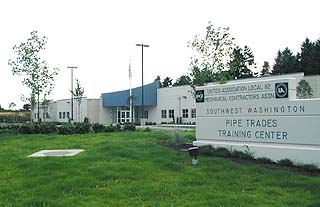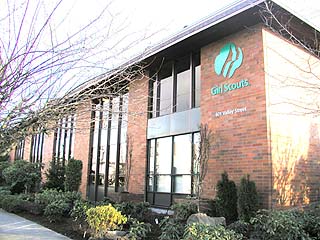
Surveys
DJC.COM
December 11, 2003
Debt can be good for nonprofits' projects
Washington State Housing Finance Commission

Crowley
|
United Way was able to do this by borrowing $8.5 million through a program that finances nonprofit facilities at below-market interest rates.
Another group that benefited from the program was the Opportunity Council in Bellingham, which rented offices for many years to house its operations. As services expanded, the group found itself outgrowing the space. Recently, the council decided to borrow $1.35 million to purchase a larger building. It now pays less than when it was renting and has fixed its space costs.



Photos courtesy of Washington State Housing Finance Commission
Tax-exempt bonds were used to finance United Way’s new headquarters in Seattle, top, the Pipe Trades Training Center in Lacey, middle, and the Girl Scouts Totem Council headquarters in Seattle. |
For years, raising all of the funds before beginning construction was the conventional wisdom for nonprofits. However, circumstances and thinking have changed. Now nonprofits use debt to their advantage. Directors of large and small organizations are choosing to include debt as a corporate tool in their facility financing strategies.
Savvy nonprofits are choosing to borrow to leverage both their fund development, with unrestricted pledge forms, and strengthen their debt capacity. This planning also insures strong cash reserves for contingencies.
Both United Way of King County and the Opportunity Council are borrowing at below-market interest rates. United Way of King County has a 25-year variable rate loan, while the Opportunity Council has chosen a 20-year loan. Because of their decision to use debt as a financing tool, they have the facility now rather than later, and they have more funds available to immediately serve the urgent needs in their community. Debt has enabled them to better embrace their mission.
Often borrowing is the right tool
Miriam Sevy, a financial advisor to many nonprofit organizations and the president of Leora Consulting, suggests that it makes sense for nonprofits to borrow for capital needs “when it is the right tool for the job.” Some examples she gives are:
- To build an endowment.
- To hold on to cash and build a reserve for operations or to pay for capital improvements that have less emotional appeal, such as a leaky roof.
- To hold on to an existing building if the timing to sell is not right.
- To spread the cost of financing a facility over a longer time.
- To improve the cash flow while waiting for multi-year pledges to be paid.
Nonprofits get lower rates
Since 1990, 91 nonprofit organizations have borrowed at interest rates at least 1-2 percent below market by using tax-exempt bonds issued by the state Housing Finance Commission. The state Legislature designated the Housing Finance Commission to be the state's issuer of tax-exempt bonds for capital facilities and equipment owned by nonprofit 501(c)(3) organizations.
Federal law allows tax-exempt bonds to both refinance and finance expenditures, including land, acquisition, construction and capital equipment, provided they are used to further the organization's nonprofit mission. Through its Nonprofit Facilities Program, the Housing Finance Commission has helped these organizations finance their equipment and facilities: Tacoma Art Museum, Snohomish County YMCA, Local 82 Plumbers JATC in Lacey, Spokane Valley Community Center, vans for Hopelink in Redmond, and a robotic whale exhibit at the Pacific Science Center.
The commission partners with lenders and the investment community to get loans for nonprofits. By law, the commission issues tax-exempt bonds on behalf of nonprofit borrowers but does not provide credit. Loans are made by banks and other financial investors that pass the below-market interest rates from tax-exempt bonds to the borrower. Since the commission is a self-funding entity, taxpayer dollars are never used for the bonds or the commission's operating expenses.
“This enables the commission to strengthen Washington communities by partnering with the financial institutions as well as provide safe and affordable housing,” says Kim Herman, executive director of the commission.
At a time when local governments are cutting funding for projects and services, “providing access to below-market interest rates is even more important,” says Tia Peycheff, director of capital projects at the commission. “By partnering with the banking and nonprofit community, we are able to enhance economic development and lessen the burden of government.”
Prepare early
When developing a facility, equity will always be necessary. For nonprofits, equity is often derived through capital campaigns. Stuart Grover, president of the Collins Group, recommends that nonprofit organizations be well prepared before starting a capital campaign. “Remember that your goal is to do a better job at your mission,” he says.
Grover offers these tips for a successful capital campaign:
- Have your financial house in order.
- Identify a demonstrated need.
- Have the best solution.
- Prepare a business plan.
- Estimate how much your project will cost.
- Do a feasibility study, what people say to your face isn't what they say behind your back.
- Investigate your leadership, giving potential, case for support, internal readiness and climate and timing.
Roy Mann, nonprofit advisor to CB Richard Ellis, emphasizes the value of having an internal decision process in place. He says have a facilities committee and designate a contact person to save time and get better results.
Impress your lender
“A lender will be interested in much of the same information as a prospective donor,” Debbie Austensen, senior vice president of Bank of America says. “A bank will want general information about your organization, and about your proposed project. They will want to know who your board members are. On the financial side, they will also be interested in reviewing three years of CPA-audited statements, projected income statements, and they will look at cash flow for three years and will want to see a list of aging pledges.”
Scott Van Batenburg, business manager at the Overlake School in Redmond, suggests hiring an outside financial advisor when selecting a bank, even if you have bankers on your board, because banks are not all alike. Van Batenburg says a financial advisor will help you develop questions to ask banks, and help analyze their proposals, and negotiate fees and charges.
“You have to spend money to save money,” he says.
Credit considerations
Examine how much debt your existing revenue can support before you determine how much to borrow. Also, keep in mind how much the existing facility costs to operate. An expanded facility may generate new cash, such as new memberships. On the other hand, moving to a new facility will include transition costs, may cost more to operate and require more staff.
Sometimes unexpected expenses related to a new facility may arise. “That's why,” according to Miriam Sevy, “it's good for a nonprofit to hang on to cash and borrow what they can afford.”
For more information about tax-exempt bonds for nonprofits, visit the Housing Finance Commission's Web site, www.wshfc.org.
Reidun Crowley heads marketing for Capital Projects at the Washington State Housing Finance Commission.
Other Stories:
- Insights Program looks at commercial real estate
- Town centers rediscovered after years of neglect
- Grocery stores cooking up more innovations
- Retail chic: Shopping centers with meeting places
- Development is changing; training should be, too
- When the government takes your property
- Don't get fenced in: Use a land title survey
- Are you paying too much property tax?
- A new corridor may be coming down the Pike
- Columbia City — the next hot spot?
- Northwest taps into waterfront properties
- Interest rate hike could mean time to sell
- David A. Sabey
- James N. Carbone
- John Solberg
- Mic Dinsmore
- Mark A. Weed
- Portland's economic Rx: a biotech future
- The recovery train has left the station: Are we on it?
- Are hotels overbuilt or just overproposed?
- Tax credit program boosts low-income communities
- Yakima Valley real estate heats up
Copyright ©2009 Seattle Daily Journal and DJC.COM.
Comments? Questions? Contact us.